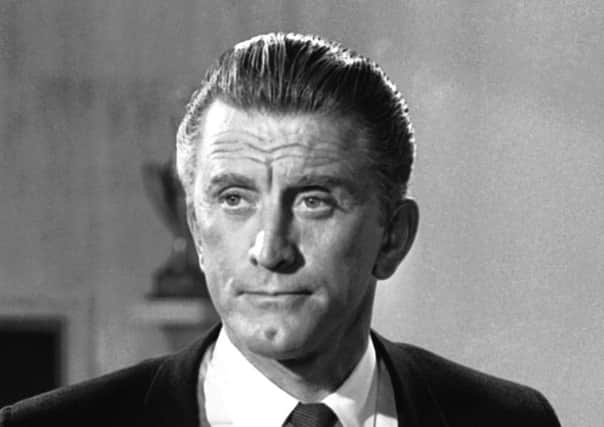Brian Pendreigh: Remembering Kirk Douglas, the most Scottish-sounding of Hollywood superstars


This most Scottish-sounding of Hollywood superstars was of east European Jewish stock, but Kirk Douglas sounded more like a movie star than Issur Danielovitch. He did come to Scotland in the early 1970s to make Catch Me a Spy. Pursued across the Highlands, he is seen fishing on Loch Awe, at the local railway station, on the Ballachulish ferry and running through a herd of Highland cattle.
Years later I met him at a film festival in Palm Springs, where he lived and where there is a street called the Kirk Douglas Way. He had had a stroke a few years previous and was very frail. I would have said he had only a few months remaining. That was 20 years ago.
Advertisement
Hide AdAdvertisement
Hide AdKirk was a fighter on screen and off, standing side by side with Burt Lancaster at the OK Corral and doing as much as anyone in the battle against the Hollywood “blacklist”.
As producer of Spartacus he hired the blacklisted Dalton Trumbo to pen this tale of an uprising against tyranny.
Ten years after I met Kirk in California I went to interview a little old lady called Kay Mander over lunch in Kirkcudbrightshire. She was in her mid-90s, living anonymously in a local authority bungalow, though she had been a pioneer documentary-maker during the Second World War. Suddenly out of the blue she revealed she and Kirk had been lovers.
They worked together on Heroes of Telemark half a century earlier. They were both married. For her it was a big deal, but not for Kirk. “He had this awful reputation,” she said. “He flew his ladies in first class, kept them there for a long weekend, and sent them back tourist.” It was the Kirk Douglas way. And yet Kay Mander thought he was “wonderful”. Her only regret was the pain it caused her husband. “Kirk Douglas was my passion,” she said.
Kirk appeared in a string of acclaimed classics – Spartacus, Ace in the Hole, Paths of Glory. He was great as Doc Holliday coughing up his lungs in Gunfight at the OK Corral. He was never the subtlest actor – John Kricfalusi, creator of the cartoon Ren and Stimpy, said: “He doesn’t just act with his face– he can act with his back. Kirk’s the only actor I’ve ever seen who can act with his back. They’ll have a shot of him from behind and you’ll see muscles twitching.”
Kirk was compelling too in a string of films no one has ever heard of.
I included two in my top 20 favourite obscure films when I edited the book The Times on Cinema. A Gunfight boiled the western down to a setpiece as Kirk faced off against Johnny Cash. You needed two iconic figures to make it work. And in The Last Sunset he was an outlaw who turns up on the doorstep of an old flame and discovers she has a husband and a grown-up daughter. He falls in love with the daughter, only to discover he is her father – Greek tragedy in Wild West clothing.
He could do dark. But he could also do light. He put everything into acting and into life. He was a charmer, a fighter, a legend and it seemed like he would go on forever. There was never a time he was not in my life. I was in the pub on Wednesday night enjoying a pint or two with my mate Niall and telling him Kirk was now 103. “I thought he was dead,” said Niall. It must have been right about that time that he did finally pass away. A few hours later I was looking at the news online and there it was – Kirk Douglas was dead.
I still have the dimple and the memories, but in that headline a little part of me died too.